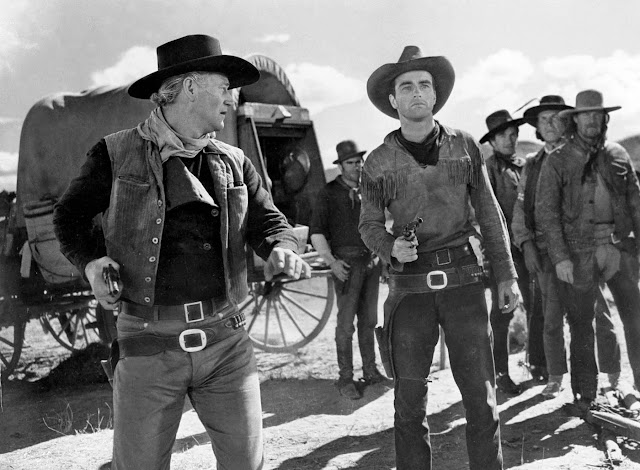Red River (1948)
Howard Hawks' "Red River"
Howard Hawks' first foray into the Western genre, "Red River," is a film that I desperately would like to watch again. Throughout the entire film, I was enthralled. The gripping psychological battle between the young Montgomery Cliff and the old John Wayne was something I found deeply engaging. The only problem for me was a problem that many people seem to have with the film, the ending.
All throughout the film, we see beautiful, stark white landscapes of the Wild West, contrasted with the stark black palette of the night. The two, white and black, can be mirrored through the white, young Montgomery Cliff and the old, black-hat-wearing villainous John Wayne. John Wayne's character, Thomas Duncan, is not a 'villain' in the classical Hollywood sense of the word. In the film, he is a far more complex character. As with the story of America itself, Thomas Duncan, is a hard, bitter man looking to secure his property, assets, and fortune after everything was taken from him in the inciting incident of a Native attack. Montgomery Cliff's Matt Garth, a young boy and the sole survivor of the attack, is taken in by Duncan and becomes his surrogate son. The plot of the film revolves almost entirely around Duncan's attempt, with Matt by his side, leading a group of men from southeast Texas all the way to Missouri. The trail gets grueling and so does Duncan, as he becomes more and more tyrannical. After Matt stages an uprising so that they can redirect the herd to Abilene, Matt spends the rest of the film knowing Duncan is tracking him down to seek revenge.
The film, at its heart, is about the young and old. The father and son. Method acting and classic Hollywood acting. The greatest generation and the silent generation. Wayne's character just wants to secure his stake in America. Cliff's character just wants the same. In order to do that, Cliff must kill his father, so to speak. He must find his own way. On the flipside, Wayne wants immortality and attempts to gain this immortality through his surrogate son. All of this acts as an allegory of sorts about perhaps the most abstract concept of our American history and about time itself. It is such a classical allegory, one could even call if biblical. The changing of the guard, the progress of different generations, and the general attitude of the new replacing the old. It is a tale as old as time played out through these Texas cattle ranchers. This is one of the most striking things about this film, its allegorical and biblical quality.
The only aspect of the film that completely takes this film out of the masterpiece column is going to sound incredibly misogynist. However, the inclusion of the female love interest, Tell Millay, completely railroads the plot of the film. The fact that it is a negative spot on the film is in no way inherent to her being a woman. Rather, it is the fact that this character becomes a deus ex machina to the whole picture. For the two hours runtime of the film, these masculine male characters psychologically and physically battle each other for their own piece of the American dream and for becoming their own man and leader. It's a tense film because of this. However, this intensity is brought to a halt by a simple tongue-lashing from the female love interest to Cliff. I felt as though the film, because of this driving intensity, should have had an 'unhappy' or 'tragic' ending. The tragedy of the film would have turned it into the biblical epic it was striving for. Instead, it seemed to have a built-in 'Hollywood' ending in which everything must be wrapped up neatly. It feels much akin to Orson Welles' "The Magnificent Ambersons" in this way - a masterwork about time and generational conflict wrapped by neatly by amicable resolution.
That being said, "Red River" is still an astounding Western filmed brilliantly by the Hollywood conformist Howard Hawks. Despite its 'Hollywood' ending, there is still a lot of meat on its bones and the inner workings of a masterpiece lie somewhere beneath its white hot desert sands.




Comments
Post a Comment